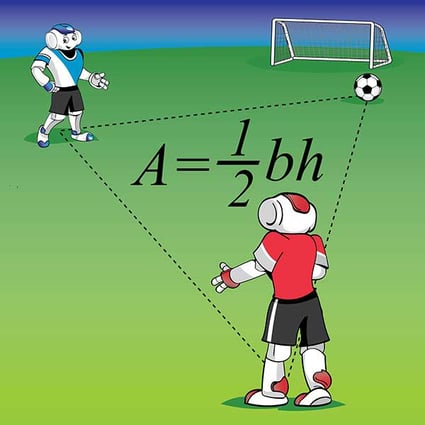Math anxiety can range from general discomfort and mental disorganization to feelings of panic and physical nervousness. For many students, math anxiety turns into a cycle of failure because the more worried they become, the less they learn. There are several techniques and activities, however, that you can use to help your students overcome math anxiety.

Anxiousness is a natural feeling, but when it is tied to a specific content area or task in the classroom it can lead to a decrease in progress. To help students work through the anxiety they feel when asked to complete a math problem or assignment, consider working through these 5 steps.
Dispel the Myths
Make sure your students do not believe any of the false statements they may have heard about math. The first myth is that you have to be born with a “math brain” to be good at it. While some people will seem to naturally do better in math than others, this is no more true for math than any other subject or activity.
Learning math is similar to learning a foreign language—with good instruction and practice, students can adequately learn math skills. Another myth is that boys are better at math than girls are. Unfortunately, boys are sometimes encouraged to pursue math-based careers more often than girls. Including more math in our daily life and activities will allow all students to see how valuable and important math is.
Turn Math into a Game
Kids love games, and turning something difficult into a game is a great way to reduce anxiety. It is also a good idea to have students work in teams when playing games or working out various math problems. In doing so, students learn how to achieve team goals and work analytically.
There is an almost endless variety of math games and fun manipulatives on the market kids can use. Try to incorporate real-world math into your students’ learning routine. For example, your young students can use a variety of math functions to measure for a recipe. Try creating a budget or planning how to lease a car for your older students. Try with robots in the classroom and help your students overcome the fear with a great learning companion, check as well different online platforms that have created lessons for kids and teachers.

Practice on a Regular Basis
The best way to feel comfortable with something is to do it on a regular basis. When practicing or doing homework, encourage your students to work on the easiest problems first. This will give them a taste of success and will lay the foundation for more difficult problems.
Be sure to incorporate a variety of activities to keep students from getting bored. This includes worksheets, hands-on activities, and games. Most importantly, talk about math. Communicate to make sure your student understands the process—ask them to explain their thinking and encourage them to solve problems in a variety of ways.
Get Help When Problems Start
As soon as your students display difficulty with math, help them overcome any problems as quickly as possible. Because students naturally learn from and help one another, having your students work in groups will sometimes be enough to help those who are struggling.
There will be other times, however, when math difficulties require more intensive intervention. Most schools will have resources available to help students who are struggling, and there is always the option to connect with tutors in the community.
Display a Positive Attitude
What adults both say and do regarding math will have a strong impact on kids, so it is important that both teachers and parents display positive attitudes about math—kids catch on quickly if there is a negative attitude towards or discomfort doing math. It is also important not to act upset if a child makes a mistake, or if they take longer than expected to grasp a particular concept.

Want to discover more STEM tools to help your students overcome math anxiety?
Check our products page and start planning your math lessons with RobotLAB! and our learning Platform EngageK12!

This article is original from The Schoolyard: https://blog.schoolspecialty.com/help-students-overcome-math-anxiety/



